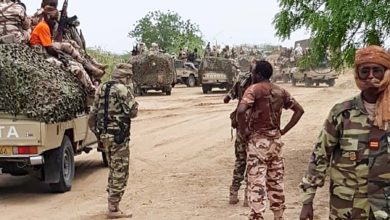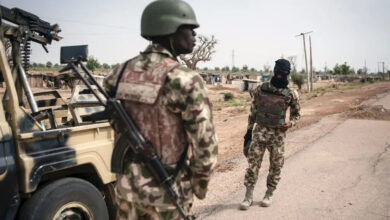Nigeria on Monday, April 20 confirmed its first coronavirus infection in the insurgency-hit northeast of the country, after a medic with Médecins Sans Frontières died from COVID-19.
The region has been ravaged by a decade-long insurgency by the Boko Haram jihadist group that has forced around 1.8 million people from their homes.
Aid workers fear the virus could prove devastating if it spreads inside the crowded camps holding hundreds of thousands of displaced people.
The Nigeria Center for Disease Control said on Twitter that it had recorded one case of the disease in Borno state, the epicenter of the conflict.
MSF, also called Doctors Without Borders, said in a statement that one of its staff died on April 18 in the state capital Maiduguri “and post mortem test results indicated that they were positive for COVID-19.”
The international aid group said it was supporting Nigeria’s health ministry “in contact tracing.”
MSF insisted it “will continue to operate, providing essential treatment for communities in Nigeria.”
“In all our projects and in order to protect our staff and patients, MSF teams have strengthened infection prevention measures, hygiene facilities, infection control and the establishment of isolation spaces,” it said.
The United Nations Humanitarian Coordinator in Nigeria, Edward Kallon, said the deceased health worker “had no travel history outside of Borno State and made the ultimate sacrifice.”
Kallon said “humanitarian actors have adapted their way of working to prevent the spread of the virus” in the region.
“A COVID-19 treatment facility and a testing laboratory have been established in Maiduguri and a second treatment facility is being developed,” he said in statement.
“Humanitarian actors are installing hand-washing stations and ensuring supply of clean water in IDP camps and vulnerable communities.”
Ten years of conflict in northeast Nigeria has left the region in no state to deal with a global pandemic.
Only half of the roughly 700 health facilities in Borno state are still working and many have been damaged by the fighting.
Humanitarian workers fear increased restrictions over the virus could hamper efforts to reach an estimated 7.1 million people in desperate need of assistance.
Nigeria has so far confirmed 627 infections from the novel coronavirus, with 21 deaths across the country.
The jihadist group known as Boko Haram began its bloody insurgency in northeastern Nigeria in 2009, but it has since spread into neighboring Niger, Chad and Cameroon, prompting a regional military response.
Boko Haram split into two factions in mid-2016. One, which is also known as JAS, is headed by long-time leader Abubakar Shekau and is notorious for suicide bombings and indiscriminate killings of civilians. Shekau pledged allegiance to ISIS leader Abu Bakr Al-Baghdadi in March 2015, but ISIS central only gives formal backing to the other faction, which it calls Islamic State West Africa Province.
ISWAP largely focuses on attacking military and government targets. Its main area of operations is the Lake Chad area of Nigeria, Chad and Niger, and to a lesser extent Cameroon, but the group has intensified attacks on military locations in west of Maiduguri in recent months.
The U.S. assesses that Boko Haram and ISWAP are responsible for more than 35,000 deaths since 2011. More than two million people have been displaced by the conflict, sparking a dire humanitarian crisis in the region.
With reporting from AFP












